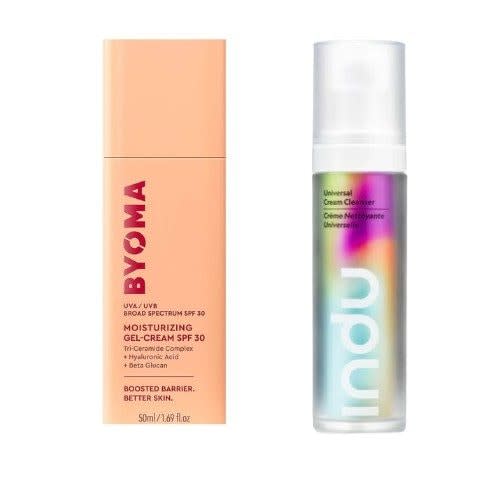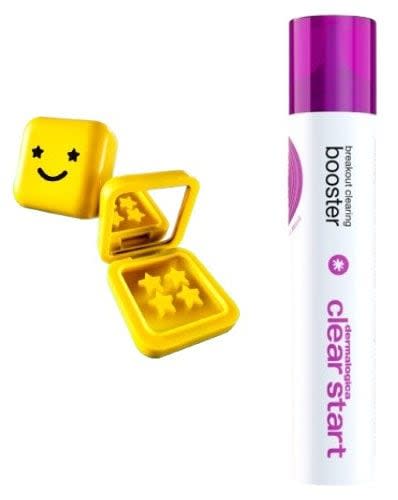I was 14 when my mother took me to the GP, tired of my constant complaints about my acne-prone skin and her secretly stealing her concealer. He nodded understandingly and gave me a prescription for a topical cream called Quinoderm; This cream was so strong that it stained my white pillowcases and school shirts a disgusting shade of yellow. This was 30 years ago. Fortunately, skin care has become much more complex and nuanced, and skin education is easily accessible. We now know that young skin is more delicate, sensitive and responsive.
So why are dermatologists reporting that children, some as young as 8 years old, are experiencing the same skin complaints I experienced 30 years ago, and as a result are demanding luxury skin care products? I asked the experts: my daughters Violet (15) and Ivy (12).
Both girls have developed expensive tastes for high-end skincare brands, whose sleek-looking products are visually enticing but packed with powerful ingredients that suit my middle-aged skin better than their own. Their interest is primarily driven by the prestige and social impact these products provide among their friends.
This is more attractive than skin health, although they vehemently deny it, it is true. They are also heavily influenced by the creators they follow on TikTok and other social media, where they both showcase their skincare routines through GRWM (Get Ready With Me) videos.
When I was young, there was no such thing as a “routine” and I would use simple, unscented, unexciting creams from Simple and Nivea that my mother bought from the supermarket for her weekly shop. I only started using Clinique when I started earning my own money. But here’s the thing. Despite my daughters’ ability to effortlessly pronounce complex ingredients like “niacinamide,” a form of vitamin B3 known for its skin benefits, they lack a basic understanding of an ingredient’s functions, the importance of concentration levels, and how it can interact with other ingredients. products in your skin care routine.
High-end skincare is the status symbol of today’s teenagers, and this sudden obsession with teenagers is understandably having a knock-on effect on retailers. “We recognize that we are attracting a new younger customer to our stores and online, largely due to the increase in popularity of the brands we carry on social media,” a spokesperson for SpaceNK told me. Type “Sephora Tween” into Google; You’ll see pages and pages of news stories about skincare-obsessed teens flocking to Sephora beauty aisles and demanding makeup while filling their carts with premium skincare. Admittedly this is much more common in America than in the UK, but with my daughters and their friends I notice first-hand how social media trends filter into real life.
As you might expect, using age-inappropriate products can cause harm and actually cause skin problems. It’s frankly mind-boggling that some young teens are demanding anti-aging products. Consultant Dermatologist Dr. Emma Craythorne told me: “The actual cause of skin disease from improper use is more problematic, so young teens using retinol or acids may be triggering their rosacea or exacerbating their eczema.” Angela Taylor, Director of Education at skincare brand Dermalogica, adds: “Children are exposed to potentially harmful content and misinformation, and they often follow trends that have nothing to do with their age or skin condition.”
I watch carefully what Violet and Ivy apply to their faces because it’s my job as a parent to keep them safe, including their skin. We regularly check the backs of medicine bottles before giving medicine to our children, so we should approach skin care in a similar way.
“Young skin is sensitive. Skincare at this age should be about maintaining skin health with daily gentle cleansing and light moisturizing to maintain barrier health,” adds Taylor. “Cellular turnover runs at optimum speed during childhood, so we don’t need exfoliation and retinoids to speed it up even further. “The use of ‘active ingredients’ can cause over-processing of the skin, resulting in damage to the skin barrier, dryness and irritation.”
Skin care can be a minefield for inexperienced parents, but the good news is that creating a good, basic skin care routine isn’t difficult. In fact, Dr. says that a consistent routine is important. Craythorne suggests that all teens need is a gentle cleanser, moisturizer, and SPF. For oilier skin, they can skip the moisturizer. It’s that simple.
The less they care for their skin with as few products and ingredients as possible, the better it will be for their short and long-term skin health. If your child mutters about aging skin, tell him to use SPF every day. It doesn’t get more preventative than that. I wish I had known this 30 years ago.
my kids use
Fun and functional


BYOMA Gel Moisturizer£15; Indu Universal Cream Cleanser£16
For tweens


Starface Hydro Star Decals£11.99; Dermalogica Clear Start Anti-Breakage Booster£25.00